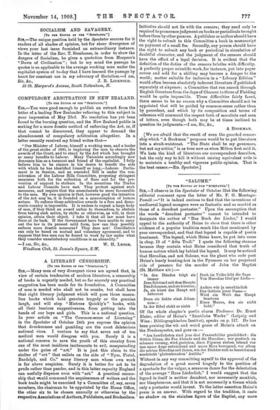COMPULSORY ARBITRATION IN NEW ZEALAND. [To TIM EDITOR OF TSR
"SPECTATOR."]
Sra,—Yon were good enough to publish an extract from the letter of a leading New Zealander referring to this subject in your impression of May 23rd. No resolution has yet been found to the burning question, and the New Zealand public is seeking for a more drastic method of enforcing the Act, or, if that cannot be discovered, they appear to demand the abandonment of compulsory arbitration altogether. In a letter recently received my friend writes that-
" Our Minister of Labour, himself a working man, and a leader of the great strike of 1890, is imploring the men to observe the awards of the Court, and to stand by the Act which has brought so many benefits to Labour. Many Unionists accordingly now denounce him as a turncoat and friend of the capitalist. I fully believe him to be sincere in his desire to benefit the side with which he has identified himself so long,—Labour.
ment is in Session, and an amended Bill is under the con- sideration of the Labour Bills Committee, proposing stringent measures both for the collection of fines and for the pre- vention of support to strikers. In the meantime the Trades and Labour Councils have met. They protest against such measures, and require that the amendments be more favourable to the men. My own opinion is that, however good the intention of the Act may be, it is founded on a misconception of human nature. To enforce these arbitration awards in a free and demo- cratic country is impossible. It is useless to expect a large body- of men, if they think an award unfair to themselves, to abstain from taking such action, by strike or otherwise, as will, in their opinion, attain their object. I take it that all law must have force at its back. If the Government have been unable to carry out the law in its present mild form, how can they possibly enforce more drastic measures? They dare not! Conciliation can only be based on mutual and voluntary agreement, and to suppose that free men can be forced to work by law under what they consider unsatisfactory conditions is an absurdity."
Windham Club, St. James's Square, S.W.










































 Previous page
Previous page